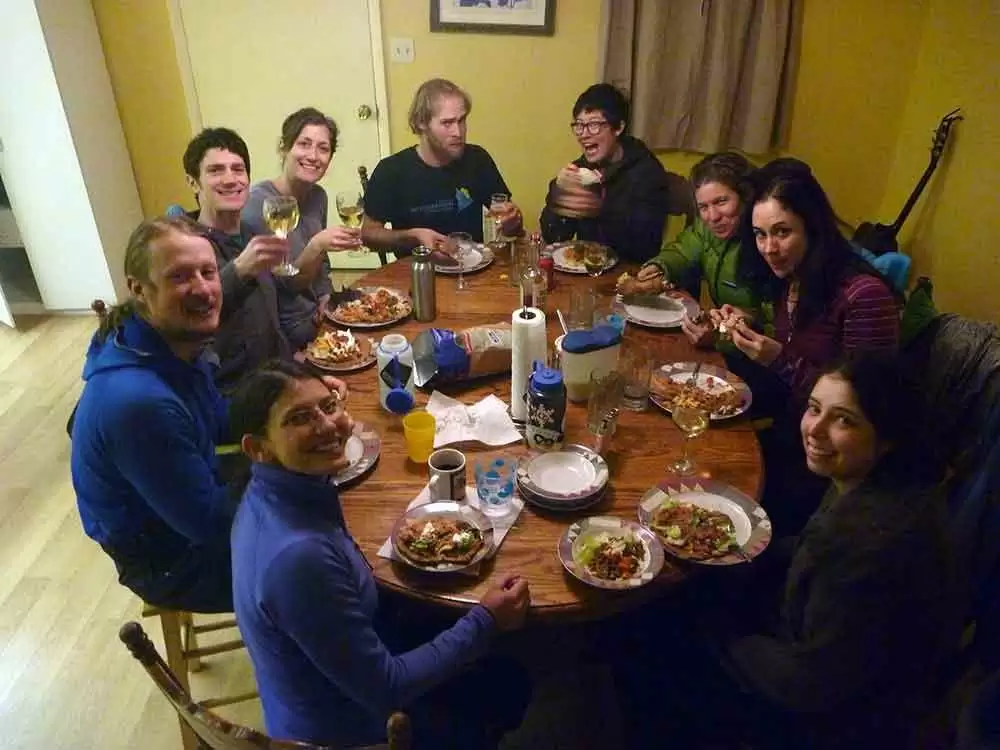
Celiac.com 02/01/2019 - When I was first diagnosed, I couldn’t believe the “rhetoric” about how sensitive a person with celiac disease is. It just didn’t resonate. I remember being told at a support group by a woman I deemed at the time to be histrionic, that a plastic strainer previously used to drain gluten-containing pasta could cross contaminate me, and that microscopic crumbs on the counter could be deadly. It just seemed to me at the time that she was “over reacting.” I thought: “Nobody could be that sensitive!” Back then I continued to bake gluten-containing goods for my husband. (That was torture by the way, to make my favorite brownies for him and not eat any of the batter.)
I made him gluten-containing bread in my bread machine. I continued to have the terrible rashes. Noticing this, my husband suggested that he only buy store-bought bread, and promised to be very careful with the crumbs. We separated the condiments, labeling the ones I used as “gluten free” with a Sharpie and storing them on separate shelves. I continued to have the terrible rashes, becoming desperate for them to go away. Somehow, in spite of his carefulness, I was getting “glutened.”
Celiac.com Sponsor (A12):
We decided together that we had to make the house gluten-free. Meanwhile, I developed recipes that replicated the foods we loved before – all gluten-free. I finally recovered my health because of living in a completely gluten-free home. I realized that the support group woman was right, and that a minute amount of gluten can cause me weeks of misery. Today, we do not allow gluten in our home at all, except in the bottled beer my husband occasionally drinks. Beer leaves no crumbs and is easy to contain, and it is a small concession for all that my husband does to accommodate me.
Many of the people I interviewed in the survey (Relational Aspects of Food Sensitivities - Survey Half-Time Report) reported that they also have gluten-free homes, but some didn’t. Those who didn’t described being regularly cross-contaminated in their own homes. Those who lived with the ever-present threat of accidentally ingesting gluten reported relationship strife. Several participants told me that gluten was the “straw that broke the camel’s back” in breaking up their partnerships. Having to dodge gluten in the one place that all of us should feel the safest compels me to contrast other diseases such as diabetes, alcoholism, and coronary heart disease with the experiences I discovered with my research of those living with celiac disease.
Diabetes is a life-threatening illness that requires vigilant management
A study conducted by Rintala, Paavilainen and Kurki (2013) showed that families members living with an individual with diabetes often engage in compassionate behavior, such as urging glucose checks, offering appropriate foods and keeping a close watch for signs of hypoglycemia. The authors reported that family members consider the management of diabetes as an integral responsibility to ensure adherence. Another study conducted by Manoogian, Harter and Denham (2010) found that family members take on an attitude of solidarity to support members with diabetes. When a person declares they have diabetes, their dietary needs are typically respected. Contrastingly, when a person determines they are gluten sensitive, they are often subjected to scrutiny, suspicion, and doubt. Many participants that I interviewed expressed frustration in convincing family members of their gluten-free requirements. Whereas those with diabetes can sometimes indulge in sugar consumption, adjusting their insulin accordingly, for those with celiac disease, a little gluten is not an option. Presently, those with celiac disease do not have a reliable gluten-cancelling drug.
Cohabitants living with a recovering alcoholic are urged to curtail alcohol in the home
The prevailing advice for families with a recovering alcoholic is to maintain a ‘dry’ home (a home without alcohol) in order to reduce temptation and to make it less available to encourage long-term abstinence (Groh, Jason, Davis, Olson, & Ferrari, 2007). Further, to reduce feelings of isolation on the part of the recovering alcoholic, it is recommended that family social gatherings forego serving alcoholic beverages. In addition to removing all alcohol from the home, recovery centers (Addiction Center, 2018) also recommend finding ‘sober’ activities to do together, building a peer group of ‘sober’ friends and focusing on different elements of life, to help the recovering alcoholic maintain sobriety. Of course, all families handle this differently, ranging from full cooperation and support, to continuing to drink in front of the recovering alcoholic. A person with celiac disease living in a gluten-filled home is similar to a recovering alcoholic living among regular alcohol consumers. It just causes strife.
Another disease that affects family diets includes coronary heart disease
In a longitudinal study of nearly 200 families, McKenzie (1982) found that family compliance to the heart-friendly diet ensured success for the family member with heart disease. In fact, family compliance and adherence achieved the highest levels of success (p. 104). Many of the participants in my study reported that their families, especially extended families, did not adhere to the gluten-free diet.
Celiac Disease is a life-altering illness that requires vigilant, lifelong adherence to the gluten free diet
Living in a house where gluten is present poses serious health risks for those with celiac disease or non-celiac gluten sensitivities (NCGS). Gluten crumbs and flour dust in the air affect those who are most sensitive. The risk of cross-contamination through the slip of a knife on bread makes it risky once the jar is open. Airborne gluten inhaled from cutting a gluten-containing sandwich, according to Hendricks (2013) and flour dust from baking is enough to “trigger the inflammatory cascade” for those with celiac disease (p. 52). Those with celiac disease who live in homes where gluten is the fare risk cross-contamination.
Research by Catassi et al. (2007) indicates that 200 ppm, the amount of gluten permitted in European “gluten-free” products that are made using Codex wheat starch, “is not a safe threshold because the harmful gluten intake of 50 mg/d could be reached even with a moderate consumption (less than or equal to 250 g/d) of nominally gluten-free products” (p. 165). Further, Laurin, Wolving and Fälth-Magnusson (2002) report that gluten in small quantities can trigger relapses for those with celiac disease. Therefore, a person with celiac disease living in a home where gluten is present may present an ongoing health hazard.
In the interviews I conducted last year for my dissertation, many participants reported that their homes were not gluten-free. Some said they have suffered regular cross-contamination as a result become sickened on a regular basis. In a quality of life study, Peniamina, Bremer, Conner and Mirosa (2014) found that those with celiac disease reported, “Other people don’t understand about my food allergy and are uncooperative or unkind toward me” (p. 935). Is it unkind for other family members to continue to consume gluten containing foods in the home of a person with celiac disease?
What do you think? Here are some conversation-starter questions:
- Is it reasonable for those with celiac disease or NCGS to request a gluten-free home – similar to the homes described above for those with coronary heart disease, or recovering from alcoholism, or living with diabetes?
- Someone I know recently told me that he was going to keep eating gluten in spite of the consequences because he was afraid his soon-to-be-wife would not marry him if he had such drastic dietary restrictions. Is the diagnosis of celiac disease or food allergies potentially a relationship breaker?
- How do you manage to stay gluten-free and un-cross-contaminated in your home? How do you assert your gluten-free needs in your household?
Please share your experiences below and how you manage your gluten-free requirements in your home.
References:
- Addiction Center (2018). Retrieved from https://www.addictioncenter.com/rehab-questions/how-do-i-help-a-recovering-addict-or-alcoholic/
- Catassi, C. Am JClinNutr 2007; 85:160–6. A prospective, double-blind, placebo-controlled trial to establish a safe gluten threshold for patients with celiac disease.
- Fasano, A. & Catassi, C. (2012). Celiac Disease. The New England Journal of Medicine, 367(25), 2419-2426.
- Groh, D., Leonard, J., Davis, M., Olson, B., & Ferrari, J. (2007). Friends, Family, and Alcohol abuse: An examination of general and alcohol-specific social support. The American Journal on Addictions 16, 49-55. doi: 10.1080/10550490601080084
- Hendricks, J. (2013). Understanding inflammation. Alternative Medicine 12, 50-53.
- Laurin, P., Wolving, M., & Fälth-Magnusson, K. (2002). Even small amounts of gluten cause relapse in children with celiac disease. Journal of Pediatric Gastroenterology and Nutrition. 34, 26-30.
- Manoogian, M. M., Harter, L. M., & Denham, S. A. (2013). Storied Nature of Health Legacies in the Familial Experience of Type 2 Diabetes. In J. Koenig Kellas (Ed.) Family storytelling: Negotiating identities, teaching lessons, and making meaning (pp. 79-96). New York, NY: Routledge.
- McKenzie, J. (1982). Long term cholesterol response and compliance with modified fat eating styles among families at increased risk of coronary heart disease. (Doctoral Dissertation). Retrieved from ProQuest
- Peniamina, R. L., Bremer, P., Conner, T. S., & Mirosa, M. (2014). Understanding the needs of food-allergic adults. Qualitative Health Research, 24(7), 933-945. doi: 10.1177/1049732314539733
- Rintala, T. M., Paavilainen, E., & Astedt-Kurki, P. (2013). Everyday living with diabetes described by family members of adult people with Type 1 Diabetes. International Journal of Family Medicine. doi: 10.1155/2013/967872









Recommended Comments
Create an account or sign in to comment
You need to be a member in order to leave a comment
Create an account
Sign up for a new account in our community. It's easy!
Register a new accountSign in
Already have an account? Sign in here.
Sign In Now